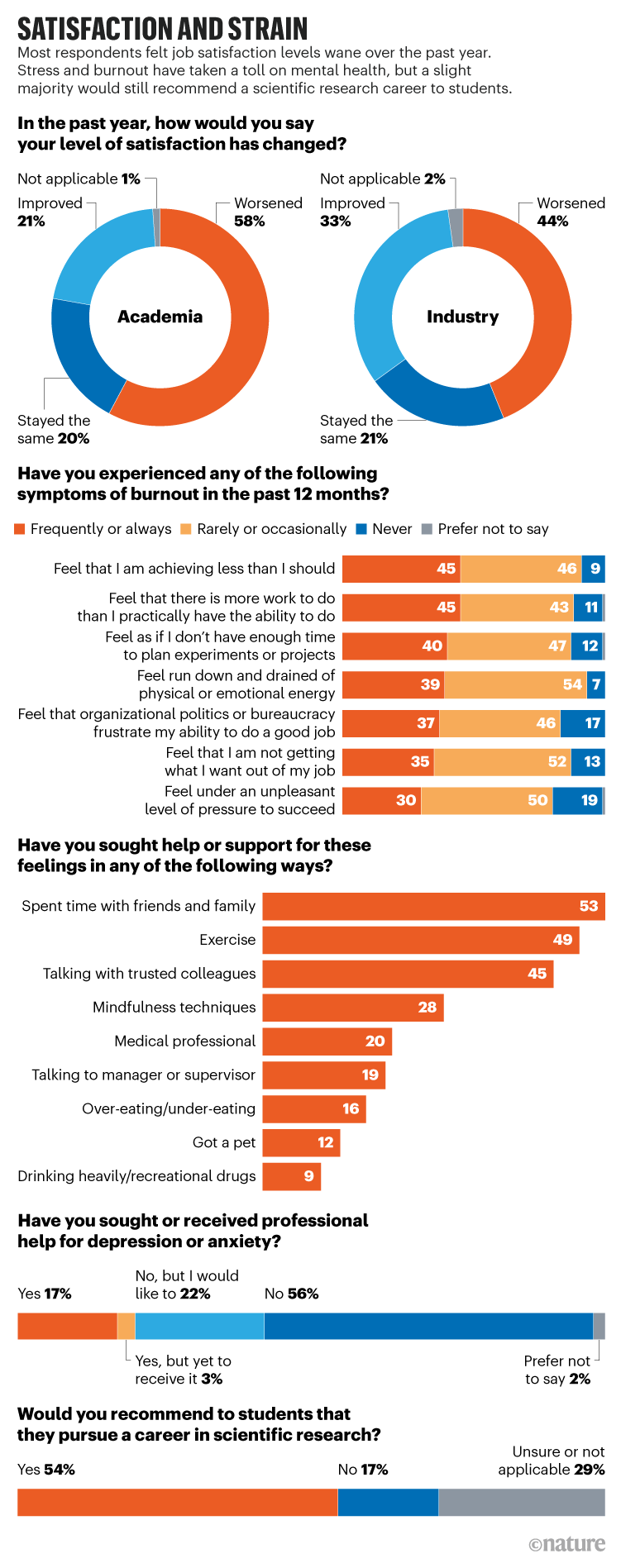Scientists around the world could learn something from the cautionary tale of John Henry, a US folk hero who literally worked himself to death, says Tiffany Rolle, a science education and engagement fellow at the National Human Genome Research Institute in Bethesda, Maryland. Rolle co-wrote a 2021 paper about stress, burnout and ‘John Henryism’ in the STEM workforce.
Science tends to attract people who want to get to the bottom of important questions, but few things in science are ever fully solved, says Rolle. “That level of curiosity can keep you on a hamster wheel,” she says. “The finish line isn’t strongly defined unless you define it for yourself.”
John Henryism is a term that particularly applies to under-represented groups, who feel an especially intense pressure to perform, she adds. “You are in a competitive field, but you’re constantly getting these messages that you aren’t good enough, that you shouldn’t be here, that you barely made the cut. There’s a chip on your shoulder to prove yourself.”
Stress, burnout, impostor syndrome and the mental-health problems they can trigger are strongly tied to job satisfaction, a key focus of Nature’s 2021 careers survey (see ‘Nature’s salary and job survey’).
Less than 60% of respondents to the sixth Salary and Job Satisfaction survey reported being satisfied with their positions. That’s about 10 percentage points less than in earlier satisfaction surveys, including the previous one, which ran in 2018.
As satisfaction wanes, mental health seems to be a growing concern. Forty-two per cent of respondents said they had sought help or wanted to seek help for job-related anxiety or depression, a rise of six percentage points from 2018.
This year’s survey ran in June and July and drew responses from more than 3,200 self-selected scientists at various stages of their careers. It included a series of questions that illuminate the realities of working life. Through survey answers and free-text comments, the respondents shared the upsides and downsides of scientific careers. Follow-up interviews with selected respondents provided a glimpse of the real-life stories behind the numbers. All in all, the survey suggests a growing uneasiness with a career path that still manages to challenge and inspire.
A low point for satisfaction
The 58% of respondents who said they were either somewhat or very satisfied with their positions marks an all-time low in the ten-year history of annual Nature surveys. Our 2020 survey of postdoctoral researchers, a group particularly prone to overwork and stress, found a satisfaction rate of 61%. In the 2019 survey of PhD students, 71% of respondents said they were satisfied with their PhD experience. Our 2018 survey, the most recent survey of the general scientific population, found a satisfaction rate of 68%.
In this year’s survey, more than half (54%) of respondents said that their job satisfaction had worsened in the past year. That period was marked by widespread COVID-related slowdowns and disruptions, but the pandemic wasn’t the only factor darkening the moods of scientists. Fiona Simpson-Fraser, a cancer researcher at the University of Queensland in Brisbane, Australia, says that her satisfaction significantly worsened as demands of the job steadily increased. “I love the work I do. I love the science,” she says. “The problem is the conditions that we work under.” She continues: “As a profession we’ve gotten into a position where we work every night, we read theses, we review for journals, we sit on grant panels, all for free. I basically have two full-time jobs.”
For many, long hours are a fact of life in science. Nearly one-third (31%) of respondents reported working more than 50 hours a week, even though only 2% indicated that such long hours were written into a contract. Working weeks of 50 hours or more were twice as common in academia (36%) as in industry (18%). Overall, 59% of respondents said they were satisfied with their work–life balance, down from 70% in 2018.
Burnt out on science
Signs of burnout were common. Forty-five per cent of respondents said they frequently or always felt that they couldn’t keep up with the demands of the job (see ‘Satisfaction and strain’). Fifty-one per cent of female researchers, and 39% of their male counterparts, said that they felt that way. A woman who is now president of her own health-care company in the United States said that, earlier in her career, she was forced to invest more “time, effort and personal resources” than her male colleagues to achieve similar levels of funding and respect. Thirty-nine per cent of all respondents said that they frequently or always felt drained of emotional and physical energy. Forty-five per cent of respondents felt that they weren’t achieving as much as they should.
All that stress exacts a mental toll. In this survey, one in five said that they had sought help for depression or anxiety caused by their work, and 22% that they had not sought help but wished they had. That’s a notable increase since 2018, when 16% said they had received help and 17% that they had wanted help but had not yet sought it out.
A tenure-track biomedical professor in the United States who said that he had not sought professional help but would like to do so added this comment: “It is amazing to me how we can be in seminars about the impact of stress and sleep disruption on cancer outcomes, for example, and then we are all stressed and under-slept. We rarely recognize how much selection there is in academia for those willing to sacrifice health and family for their career.”
Rolle says that the high number of respondents reporting mental-health issues and burnout is hardly surprising. Not only is scientific work becoming more stressful, but the stigma surrounding mental health is fading away, she says. “People are more willing to talk about burnout and pressure because it’s such a common thing,” she says. “You see it on social media. Everyone is frazzled.”
Industry strengths
Sometimes, a change of role can be good for a person’s mental health. Ana Rakonjac says that she felt extreme strain as a postdoctoral physics researcher at Durham University, UK. She spent more than five years working on a series of short-term contracts that lacked stability or security. Over that time, she accumulated managerial and supervisory tasks that greatly added to her workload without changing her job title or salary. “I learnt a lot, and it was good for my career, but it was quite stressful because the responsibilities and the work hours kept piling up,” she says. “I got massive migraine headaches that ramped up around that time.”
Rakonjac says that, as a postdoc, she also frequently experienced ‘impostor syndrome’, the feeling that a person isn’t worthy or doesn’t belong. “At a university, everyone around you knows more than you do,” she says. “Professors have been doing this for decades, so it’s easy to think that you know very little.”
The impostor syndrome disappeared when Rakonjac took an industry job at Atomionics, an atomic physics company in Singapore, a position she started in September 2019. “Everyone’s skills are really valued,” she says. Much of the stress vanished, too. She says that the working hours were similar to those she’d had as a postdoc, but she didn’t feel so overextended. “[In industry], I wasn’t spread between three or four tasks in a given day,” she says. In October, Rakonjac started a new job working for a government laboratory in New Zealand.
Rakonjac’s story illustrates a trend: satisfaction is generally easier to find in industry than in academia. Two-thirds (66%) of respondents in industry said they were somewhat or very satisfied with their work, compared with 56% of respondents in academia. At the other end of the spectrum, 5% of respondents in industry, and 11% in academia, said they were extremely dissatisfied with their positions.
When conditions are right, a position in academia can be extremely rewarding. Ingo Fetzer, an ecologist at the Stockholm Resilience Centre at Stockholm University, says he’s very happy with his job. He explains that the centre brings together researchers from different disciplines to tackle issues in sustainability. “Collaborations between disciplines make scientific work extremely creative and fruitful,” he says. “The work here is a group effort.”
Likewise, Suddha Sourav, an electrical engineer at the University of Hamburg in Germany, marked himself as “extremely satisfied” with his position as a research engineer. The job, which mainly involves designing devices to study visual areas of the brain, combines research with hands-on tinkering. “I get to see projects from the very abstract theoretical part to the nitty gritty details,” he says. “I always wanted to have a job where you could develop something and then prove whether it works or not. The fact that someone pays me to do that is very satisfying.”
Sourav says he’s especially grateful for the job security that comes with a permanent position. “I’m very fortunate,” he says. “I don’t need to worry if my job will run out in six months.” He adds that he could be a victim of burnout if he didn’t have the comfort of knowing that his position was secure and stable. “I’m a happy and mentally healthy scientist, but that’s not because I’m special.”
Sourav thinks that institutions could improve the working lives of researchers by creating more positions like his: permanent, well-paid jobs for scientists who don’t want to run their own labs. Such positions have been dubbed ‘super postdocs’ or ‘superdocs’. “Not everyone needs to be a professor,” he says. “Not everyone can be.”
Security means different things in different places. Sunday Akomolede, a biology lecturer at the Federal College of Education in Potiskum, Nigeria, says that he can keep his job as long as he likes. Still, he counted himself as “somewhat dissatisfied” with his job, largely because of the struggles of life in northern Nigeria. He says his pay doesn’t come close to matching his efforts. Like other educators, he worries about attacks from Boko Haram, a terrorist group with a history of kidnapping or killing students and teachers. In 2014, a suicide bomber disguised as a student killed more than 40 students at a Potiskum secondary school. “Whenever we go to work, we pray to God to keep us safe. These people can attack at any time.”
Akomolede says that his dream is to be accepted at a university in the United States where he can eventually obtain a PhD degree and become a professor. “I am looking for greener pastures,” he says.
Scientific rewards
Science will always have its appeals. Seventy-nine per cent of respondents said that they were satisfied with their level of interest in their work, and 75% said they appreciate the meaningfulness of the job. Heather Richbourg, a bioinformatician at Ultragenyx, a pharmaceutical company in Novato, California, is one researcher who knows that her work matters. The company specializes in developing biological drugs for rare diseases, including Duchenne muscular dystrophy. “Everything we do is directly linked to patients in need,” she says. She adds: “I love the diversity of things I’m working on.”
Despite everything that science has to offer, respondents had mixed feelings overall about a scientific career (see ‘Sounding off: respondents share frustrations with scientific life’). Fifty-four per cent said they would recommend a research career to students, a marked drop from the 75% who endorsed such a path in our 2018 survey.
A government staff scientist in the United States who reported making more than US$200,000 a year declined to advocate a science career despite her personal success. “The culture of science today is fundamentally inhuman and demoralizing,” she wrote. “Improve the culture, the job security, stabilize funding and then people with talent will flock to science since it is fundamentally rewarding and offers great joy.”
"how" - Google News
November 23, 2021 at 05:30PM
https://ift.tt/3xbTpYA
How burnout and imposter syndrome blight scientific careers - Nature.com
"how" - Google News
https://ift.tt/2MfXd3I
Bagikan Berita Ini



















0 Response to "How burnout and imposter syndrome blight scientific careers - Nature.com"
Post a Comment